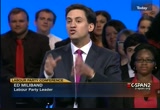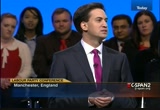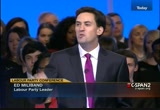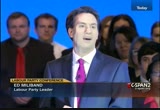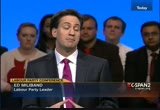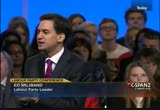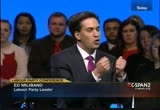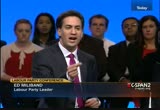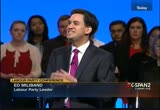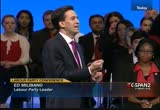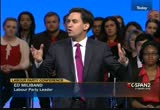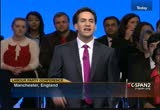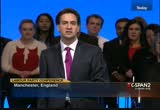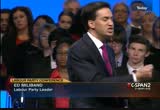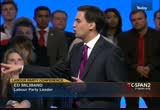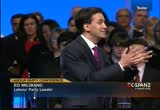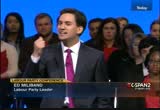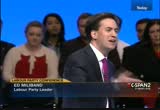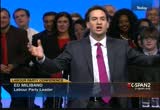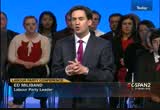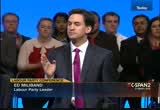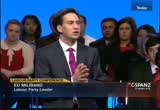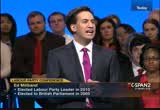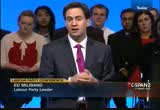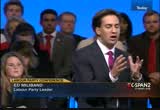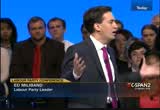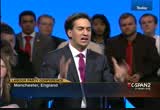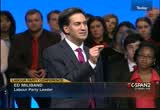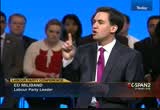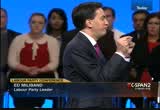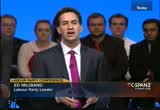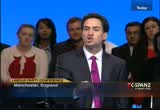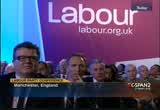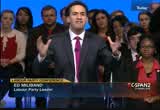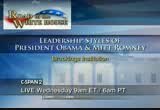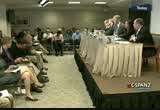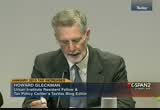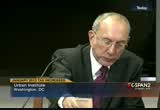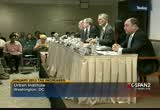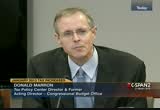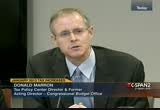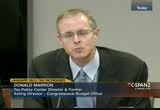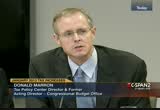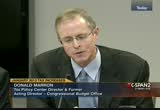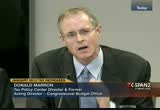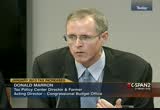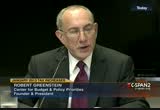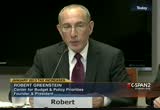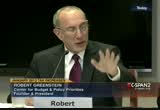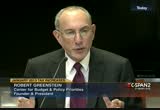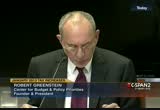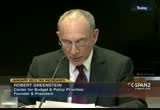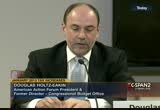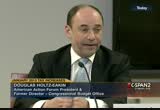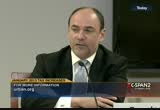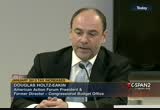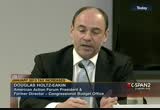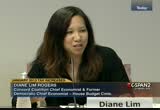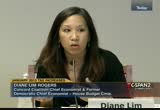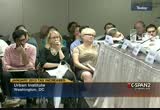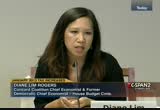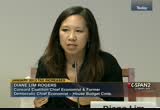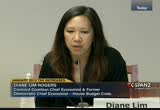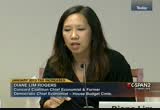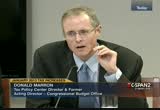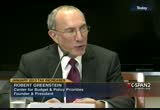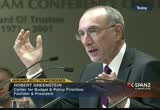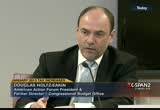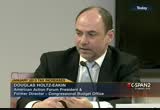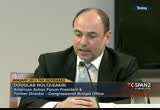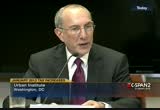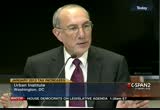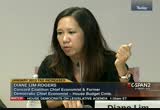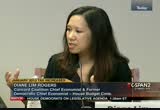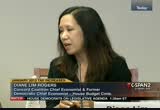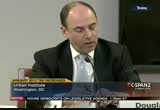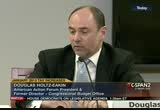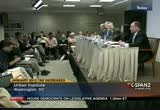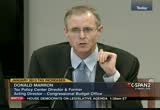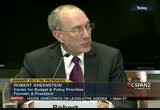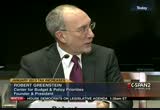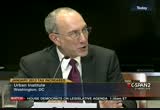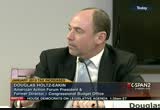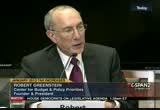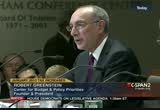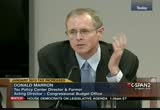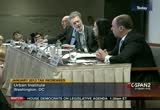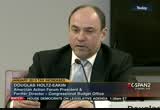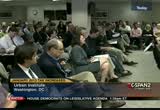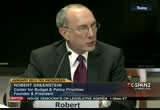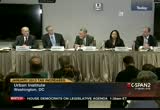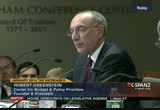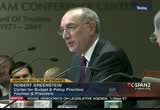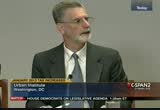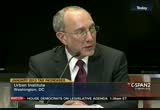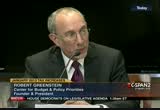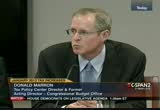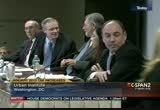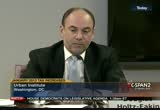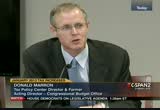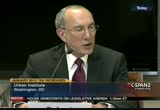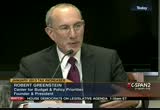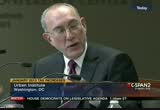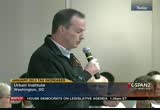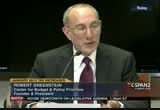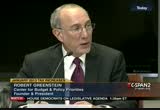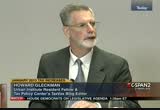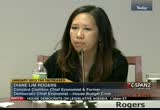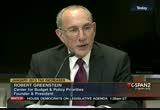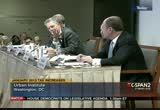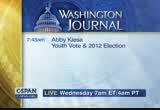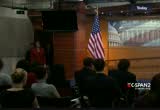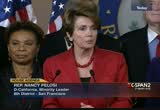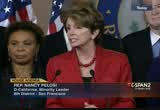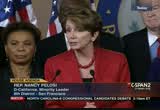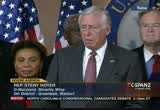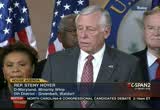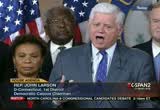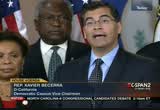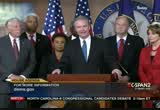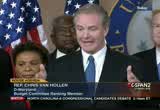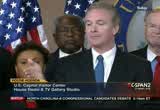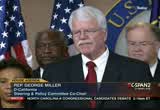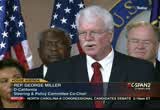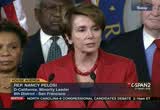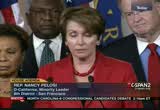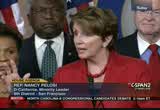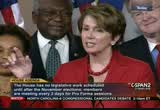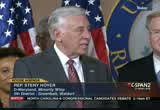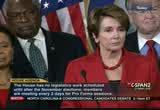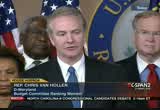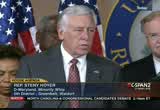tv Capital News Today CSPAN October 2, 2012 11:00pm-2:00am EDT
11:00 pm
mr. leader. i don't know about you, but i think it has a certain ring to it, like partway to north korea. [laughter] thank you for that. don't let me tell you a little insight into conference. i always look forward to conference, but the leader's speech is a dismal attached can be a bit of a shine. you get all kinds of advice from people. say this, don't say that. smile here, don't smile there. stand there, don't send there. i think tony gordon amiel for that. do you know, sometimes you get a bit fed up with it as a leader. and so the other day, this is an absolute true story. i decided to get away from it all i would go for a walk with
11:01 pm
my 3-year-old son, daniel. it was an absolutely gorgeous lake summer day. so we went out. i went to go to the park. here is the first thing he said to me. daddy, i can help you with your speech. i was like not you as well. so he is a mellow band after all. last night and he said to me, daddy, you can't do it on your own. this is absolutely true. daniel, what do you want in a speech? he said i want dinosaurs. [laughter] is that i want dinosaurs. i want flying dinosaurs. i want dinosaurs that eat people, daddy. i said no, daniel, we tried dinosaurs last term. [applause] only one problem with my speech.
11:02 pm
i what to do something different today. i want to sell you my story. i want to tell you who i am, what i believe and why i have a deep conviction that together we can change this country. my conviction is rooted in my family's story, a story that starts a thousand miles from here because the militants have in fact the same oaktree for the last 500 years. both of my parents came to britain as immigrants, jewish refugees from the nazis. i know i would not be on the stage today without the compassion and tolerance of our great country, great written. [applause] and you know -- and you now, and you know, my parents saw britain
11:03 pm
rebuild after the second world war. i was in a local national health service hospital, the same hospital my two sons would later be born. as you saw the film, i went to my local school. which may local comprehensive as people from all backgrounds. i still remember the amazing and inspiring to choose a school. a lot of my teachers, my english teacher, chris dunne is here with us today and all the teachers. [applause] it was a really tough school, but order was kept by one of the scariest diseases you could think of, mrs. jenkins. but you know what? i learned at my high school a lot more than how to pass exams. i love to get on with people from all backgrounds, whoever
11:04 pm
they were. i wouldn't be standing on the stage today without my comprehensive school education. [applause] so britain gave me -- so britain gave me, my family a great gift to my parents never have come to a safe secure childhood. and you know my parents didn't talk much about their early life. it was too painful. it hurts too much. the pain of those they lost, the guilt. but i believe that their experience that they brought up with david and myself differently as a result because having several assaults, date instilled our duty to ease the struggles of others. and this came not just from my parents experience, it came from the fabric of our childhood.
11:05 pm
there were toys and games. i was actually it dallas fan, believe it or not. [applause] so of course there was a normal thing, but every of bringing a special and mine was special because of the place of politics within it. when i was 12 years old, another south african friend of my parents. her name was ruth brooks. full of life, full of laughter. and i remember a few months later coming down for breakfast, see my mom in tears because she had been murdered in the south african secret police, murdered for being part of the apartheid. now i didn't understand the announcement, but i was shocked. i was angry.
11:06 pm
i knew that wasn't the way the world was meant to be. i knew i had a duty to do something about it. it is this out. this made me who i am, a person of faith. not a religious faith, but of faith nonetheless. a faith that i believe many religious people would recognize. so here is my face. i believe we have a duty to leave the world a better place than we found it. [applause] i believe we cannot shrug ourselves of injustice and to say that if the world is. and i believe that we can overcome if we come together as people. [applause]
11:07 pm
that is how my mom survived the war. took occur in a sheltered her from the nazis, took in a jewish girl at risk to themselves. it's what my dad found when he came to the shores and joined the royal navy, winning the war. now of course, my parents didn't tell me what career to go into. my late father, and some of you know, what the greek with many of the things they stand for. he would've loved the idea, but he would've been a little bit disappointed that it wasn't true. [laughter] my mom probably doesn't agree with me either, but like most moms, they are too kind to say
11:08 pm
so. when i was younger i wasn't certain i wanted to be a politician, but i do believe the best way for me to get back to britain, the best way to be true to my faith is their forces. that is not a fashionable views today. millions of people have given up. they think we are all the same. well, i guess you could say i am out to prove them wrong. [applause] that is who i am. [applause] that is who i am. that is what i believe. that is my days. and i know who i need to serve in britain with my faith. it is the people i met on my journey as leader of the opposition. the people who, to me in the streets and shops, who asked me
11:09 pm
about what the labour party is going to do for them and tell me the stories of their lives. it is for them, the people is not a major knee as the leader of the opposition that today's speeches for. you know, i think of the job woman i met at a youth center in london earlier this year. she was brimming with hope and ambition for the future. she was full of life. she was full of desire to get on and do the best for herself. and then she told me her story. she sent to 137 employers. she'd not had a reply from any of them. many of you in this audience will know people in the same position. just think about crushes the hope of regeneration. i want to talk to her, to a whole generation of people who feel that written is not
11:10 pm
offering them a future. [applause] i think back to the small businessman i met in july, a proud man called alan henderson. let me tell you alan henderson story. he spent 40 years building up his business, 14 years. he told me his story. he wanted to be bank manager in 1972 at his local high street bank. he got a loan and started this business is. but something terrible happened to alan henderson and his family a few years back. he was off by the bank he done with all that time. and alan henderson and his family have been living through a nightmare ever since. i want to talk to him and all the people of britain who feel
11:11 pm
their forces beyond their control. [applause] i want to talk to all the people of this country who assumed themselves and now find themselves struggling to make ends meet. they asked, why is this that when the gold price goes up, the pressure price goes up, but when the old prices come down, the pressure price just stays the same. why is it that the gas and electricity bills just goes up and up and up and they ask why you said that privatized companies can make hundreds of millions of pounds in profit at the same time train fares are going to pay 10% a year? [applause]
11:12 pm
basic system just doesn't work for them. and you know what? they are right. it doesn't. it doesn't work for them because cartels and powerful entries like government cut down to size. i want to talk to them and all the millions of people across our country who don't think they get a fair crack of the whip. i don't want to say to them, guess our problems are deep, but they can be overcome. these problems about who pritt ms. fuller and who prospers within it. one rule for those at the top, and other rule for everybody else. two nations, not one. i want to say to them today, it is not the britain you believe in. it's not the britain i believe in. it is not the written this party will ever be satisfied with.
11:13 pm
[applause] friends, we are going to change it, and here's how. we can start with the inner strength of the country. you see, the problem is that the british people. of the paralympic games. it was a trial for britain. [applause] and wanting to succeed, we succeeded because of our outstanding athletes from zara phillips, the granddaughter of a parachuting queen to a boy born in somalia called mo farah. mo farah, a true brit, a true hero to our country.
11:14 pm
[applause] we succeeded. we succeeded because of the outstanding volunteers, the game makers who are here with us today, all 70,000 game makers. [cheers and applause] they put a mirror up to britain and should have the best of ourselves. we succeeded because of our outstanding trips, outstanding trips, many of them drafted in at the last minute. let us today paid tribute to the bravery, courage, sacrifice and afghanistan and all around the world. [applause] and let's say to them, i would like to say to them, just as you
11:15 pm
do our duty by us in the most courageous way possible, soon we will always do our duty, both in military and civilian life. [applause] we succeeded. we succeeded because of our outstanding pollees. and let us in the city of manchester show our appreciation is for the extraordinary policemen and women of our country do for our country. caught back [applause] and we succeeded and this is a real blessing. we succeeded because of a group of individuals. a group of individuals against london's bid and thought
11:16 pm
nevermind, we are going to pioneer the bid to london. we are going to fight for the bid for london. we are going to win the bid for london to our very dame tessa jowell. [applause] you know what? e. nowak, friends, we succeeded because of one reason more than any other. we succeeded because of bias. we succeeded because of us, as the british people, us the british people who welcome the athletes from abroad, who chairs the non, found ourselves talking to each other each morning about what happened at the olympics the night before. whether we hadn't talked to each other before, we succeeded because we came together as a country.
11:17 pm
we were together as a country. we join together as a country. that is why we achieve more than we imagined possible. you know, i'll have to tell you this. i can't remember a time like this in the whole history. i can't remember a time like, the sense of a country united, that sense of the country at felt it was together. that is the spirit this labor party believes them. [applause] but i may not remember that spirit. but that spirit has occurred rough british history. you know, 140 years ago, 140 years ago to the year, another leader of the opposition gave a
11:18 pm
speech. it was in the free trade they used to stand opposite this building, the radisson now, by the way. [laughter] his name was benjamin disraeli. he was a tourist, but don't let that put you off just for a minute. his speech took over three hours to deliver. don't worry, don't worry. [laughter] if you drink two whole bottles of brandy while delivering it. that is absolutely true. i just want to say, i know a speech that long would probably kill you in the brandy would definitely kill me, but let us remember what is really for celebrating for her. it was a vision of britain were loyal to your loyalty and dedication to the common cause courses through the brain of law and nobody feels left out. it was a vision of britain
11:19 pm
coming together to overcome the challenges we face. it's really called that one nation -- one nation. we heard the phrase again as the country came together to defeat fascism and we heard it again as clement attlee builds britain after the war. [applause] friends, i didn't become leader of the labour party to reinvent the world of 73 or attlee. i believe in that spirit, one nation, a country where everyone has the day. one nation can make an issue where prosperity fairly shared. one nation where we have a shared destiny, a sense of shared and other and a common
11:20 pm
life that we laid together. that is my vision of one nation. that is my vision of written. that is the britain we must become. [applause] in here is the genius of one nation. it doesn't just tell us the country we can be. it tells us how we can rebuild. we won the war because we were one nation. we built the peace because labour government and conservative government under said we needed to be one nation. every 10 britain puts its greatest challenge, we've only come to the fore because we were one nation. but too often, governments have to go over that lesson. with 1 million people out of one, we just can't succeed as a country. but the gap between rich and poor growing wider and wider, we
11:21 pm
just can't succeed as a country. with millions of people feeling the hard work and effort are not reported, we just can't succeed as a country. and with so many people having been told for so long that the only way to get on this to be on your own come in yourself. we just can't succeed as a country. yes, friends. [applause] yes, friends. [applause] come through the form to overcome the challenges that we face. we must rediscover that spirit. that spirit of british people never forgot. that spirit of one nation. one nation, a country where everyone plays their part. a country we rebuild together. [applause]
11:22 pm
so, here's the big question of today. who can make up one nation? who can bring great together? what about the tories? what about the tories? i didn't hear you? what about the tories? let me explain why. let me explain why. i want to talk very directly to those who voted for david cameron in the last election. i understand why you voted for him. i understand why you turned away from the last labor government. this took economic times. it is a country still coming to terms with the financial crisis, a financial crisis has afflicted every country around the world. i understand why you're willing to give david came and the
11:23 pm
benefit of the doubt, but i think we've had long enough to make a judgment, long enough to make a judgment because they turned the recovery into the longest double dip recession since the war. because there are more people looking for work for longer than any time since the last time there was a conservative government. [applause] and here's the other thing. what about aravinda? the thing they said was their number one priority, this year borrowing is rising, not falling. let me just say that again. borrowing, the thing they said was the most important priority. the reason they were elected is rising, not falling. not because there hasn't been
11:24 pm
tax rises think i suspect dean every family in this country. not because they didn't want to cut borrowing. they did. abacus or services are getting worse. they are. but because if you stop an economy growing, it will be of more out of work claiming benefits, not paying taxes. businesses struggles that they are not paying taxes. and as a result, borrowing goes out. our income not to invest in schools and transport and education, but are we to keep people idle so the next time you hear a conservative say to you, labor would increase borrowing. just remember it is this government that is increasing borrowing this year. [applause]
11:25 pm
so what have we seen? we have seen recessions, higher unemployment, higher borrowing. i don't think that is what people were promised. there will be some people who say, and this is an important argument. it will be some people who say they were short-term pain, but it is worth it for the long term gain. and i'm afraid the opposite is true. the longer you have low growth in the country, the baker to debt comes to the future and the bigger problems will be in the future. the longer a young person is out of work, that's not just bad for the prospects now. it is bad for their prospects for the whole of the rest of their lives. and it's a small business under the recession come it can't just get up and running again during the primary. so if david can assist you, while the malicious carry-on and
11:26 pm
paid for something to turn up. don't believe him. don't believe him. if the medicine is not working, you change the medicine. [applause] and i will tell you what else to change. to change the doctor, too. that is what a country needs to do. [applause] now look around here. look around you. you know, the problem is the british people are paying the price for this government failure. you're not going back to the bank because you can't afford it. your tax credits are being cut
11:27 pm
because the government says he can't afford it appeared her frail mom and dad are not getting the care they need because the government says it can't afford it. but there are some things this government can afford, the wrong things. what we think of this most difficult economic times to get up out of my difficulty is? what they choose as their priority, a tax cut for millionaires, a tax cut for millionaires. next, david cameron will be writing a check for 40,000 pounds to each and every millionaire in britain. not just for one year, but each and every year. that is more than the average person earns in a whole year. at the same time as they are
11:28 pm
imposing a tax on pensioners next april. friends, we the labour party commit the country knows it is wrong. it is from what they are doing. it shows their priorities. and here's the worst part. david cameron isn't just writing the check. hughes receiving one. he's going to be giving the millionaires tax cuts. [applause] so next week, maybe mr. cameron can tell us how much he is awarded himself a tax cut, how much a tax cut is rewarding himself for a job i guess he thinks is a job well done. how many of his other cabinet colleagues have checked on the millionaires tax cuts and how can you justify this unfairness in britain 2012.
11:29 pm
[applause] and of course, let's not forget this tax cut wouldn't be happening without nick clegg and the liberal democrats. [applause] isn't it shameful that the party that supports it, that implemented the people's budget of 1909, lura church's budget is supporting a millionaires budget of 2012? [applause] so that is the reality in britain today. it is a rip off for everybody else. is it a recovery for the top, a recession for everybody else. this prime minister says we are all in it together. delphi can never tell us again. we are all in this together.
11:31 pm
one thing that the government might claim to be gooded at, and that's competence. [laughter] they think they are born to rule. so maybe they would be god at it. have you ever seen a more incompetent, hopeless, out of touch, you turning make it up as you go along, miserable shower from the government? [applause] [applause] [applause]
11:32 pm
[applause] there's more. there's more. but there's more. [laughter] what have we had? we've had -- the tax, the church tax, we had the [inaudible] tax, we the grammy tax, panic at the pump. we had dinner, we country surface with rebekah brookes. [laughter] [laughter] he said the text remember? lol. [laughter] now what do we have? the minister murdoch becoming the minister for the national whole service. we have an international development secretary. she says she doesn't believe in
11:33 pm
international development. [laughter] again, e with have a party chairman who writes books about how to beat the recession under a false name. [laughter] i'm not making it up. i'm really not making it up. i have to say, if i was chairman of the conservative party, i would have a false name too. there it is. [applause] but here's my farted one, of course, -- my favorite one of all. he made an appointment in order to resign but david cameron was too competent to know that he wanted to resign.
11:34 pm
he's still in the government. they are so useless, they can't even resign properly. it's up to us. let he say to you, one tbhaition it another way of avoiding the difficult decisions. it's a way of making the difficult decision. i have to be clear about the next labor government. you see, i think it is incredibly important to be one nation we must show compassion and support for all those who cannot work. particularly the disabled men and women of our country. [applause] [applause] but in order to do so those who can work have a responsibility
11:35 pm
to do so. we can't lead people out of work for one year, two years, three years, we have a responsibility to help them and they have a responsibility to take the work that is offered. [applause] to be one nation to be one nation we have to give greater dignity. we have to tackle crisis that the family -- living longer should be one of the great virtue of the 21st century. we need to be able to afford to do that, we have work longer, have a later retirement age than we do now. to be one nation, reto live within our means. borrowing is getting worse, not better. it means we'll have tough settle
11:36 pm
for the public service. it will make life hard for for those who use them. here's the big difference between one nation and lead by me and the current government. will always bear the greatest burden. i would never cut taxes that is not being one nation. and here's the oh thing, i will never accept an economy where the gap between the rich and the poor grows wider and wider. in one nation, in my faith,
11:37 pm
inequality matters. it matters to our country. what does it mean to our country? we can't go back. it we must be the party of the private sector just as much as the public sector. the small business struggling again the. the help struggling against the -- [inaudible] [applause] we must be the party of south justice as much as a party of the north. [applause] there is no future for this party as a party of one section
11:38 pm
nam sectional interest of our country. [applause] it is right move on for new labor. new labor despite the great achievement the responsibility of those of the talk and too timid about the accountability of those with power. in one nation, responsibility goes all the way to the top of the party. the richest in the party has the biggest responsibility to share responsibility to the rest of our country. [applause] i have news for the powerful in our country, in one nation no interest from rupert mure dock to the bank is too powerful to
11:39 pm
be held to account. [applause] [applause] we must be a one nation party to become a one-nation government, to build a one-nation britain. and here's how we are going to take some steps to to that. we need a one-nation economy. and the first big mission of the next labor government is to sort out the banks. sort them out once and for all. not just -- [applause] not just prevent another crisis but to do what hasn't been doing in decades. necessary to enable us to pay our way in the world. we need banks to serve the country, not a country that serves the banks.
11:40 pm
[applause] think about the small business i talked about earlier on. he wanted to be able to go to the bank, look at the manager in the eye, and know he was working for him. instead he found a bank more interested in playing the international money markets. that's why he was ripped off. of course, this government promised change, but things aren't really changing. so i've got a message for the bank. we can do this the easy way or the hard way. either you fix it yourselves between now and the election, or the next labor government will once and for all ensure that the high street bank is no longer the arm of a casino operation and we will -- [inaudible] [applause]
11:41 pm
[applause] it's all too radical. carry-on as we are. we can't carry-on as we are. two nations not one. the banks and the rest of britain. we must be have a one-nation banking system as part of a one-nation economy. [applause] we need an education system that works for all young people. [applause] to be a one-nation economy, you
11:42 pm
have to use all the tal leapts of all of our young people. not just the socially right, it's absolutely essential for our economy for the future. i remember when chris and i were at -- [inaudible] i remember school my comprehensive. the kids who were gotted a passing exams who were academiaic, they could go to university, and the world would just open to them. like it did for me. but think about all those kids who have talent and ability, great talent and ability, school didn't offer them enough. it was twenty five years ago and it's even more true today. think in your mind's eye about the 14-year-old today. today is a school day. think about the 14-year-old.
11:43 pm
no academic already border school, may be all right starting the process of -- [inaudible] not going to school. of course, they need to get back to school and the parents need to get them back to school. they can't afford to go through life with no qualifications, and britain can't afford for them to do it either. but we can't just say to that 1-year-old, just put in the work because we've been failing them too. you see, for a long time our party has been focused on getting 50% of young people in to university. i believe that was right. but now it's time to put our focus on the forgetten 50% who do not go to university. [applause]
11:44 pm
here's the choice i want to offer to the 14-year-old who is not academic. english and matt but the rig corp. and the curriculum matter. courses that engage them and are relevant to them. work experience with employers and cull man nateing at the age of 18, new a new gold standard qualification they know whether they're taking their exam, they have a gold standard vocational qualification a new technical back gluer yet. a qualification. [applause] [applause] a qualification to be proud of. you know, we have to change the cultural of the country, friends, we can't be a country where vocational qualification are seen as second class, they are a real route to apprenticeships and jobs. they can be valuable for the young people as the university degree. we need to make it so.
11:45 pm
[applause] there needs to be the real route to apprenticeship. there's another problem. only one in three large employers in britain actually offer an apprenticeship. and anything in the public sector, the situation is far, far worse. that is about a cultural of a country. that is about a cultural of a country which hasn't been dealt with for decades. it is a talk of next government to do that. for the public sector has to step up to the plate and understand that we can't be two nations. we can't be two nations. and when the public sector
11:46 pm
officers more contracts to the private sector, the next labor government will ensure that every private sector contract will only be awarded to a company that trains the next generation with apprenticeships. [applause] [applause] when the fub lick sector is having a it's not just buying good and services it must be about building one nation together public and private sectors joining together to do it. [applause] [applause] we need a new deal with british business. you get control of the money for training as we have asked for.
11:47 pm
you set the standards as we have asked for. but you have a responsibility to make sure the training happens. in one nation there is no place for free riding. free riding where funds -- [inaudible] puts workers from firms that do. [applause] think about in vision of education, education to the age of 18 was proper vocational qualifications and let's think about the vision from the conservatives. michael -- [booing] who wanted to bring back -- [laughter] i think i get to the point. michael who wanted to bring back
11:48 pm
two-tier academic exams. i remember what it was like. o level and cse. one whole group of young people written off. we are not going back to those days. [applause] [applause] mike who'll has content for vocational qualification and abolished the best vocational qualification our country has and michael who has nothing to say about education to -- in education there really is a choice of two futures. education for a are in reiing and narrowing elite with a conservative or one nation skill system as part of a one-nation
11:49 pm
economy with a next labor government. [applause] [applause] to be a one-nation economy we have to make it easier for them and harder for the -- i think one year people know what i was talking about. [laughter] [applause] [applause] you see -- you see -- businesses tell me that the pressure for the -- from the city investors can't take a long view, they want to plan one year, two years, ten years ahelp. but they have to publish their accounts in britain every three months. in line with the wishes of the best of british business.
11:50 pm
we will end that so companies in britain can k take a long-term productive view for our country. [applause] companies in britain are far more easily bought and sold than in many other countries. did you know that when a take over is launched the hedge funds and the speculators can swoop in for a quick process. they are not acting in the interest of firms for the nation. they're in if for the -- and we will change it. and here's the thing, here's the thing, ladies and gentlemen, i invite british business to work with us in a next labor government. let's refound the rules of the game so we have a one-nation business model as part of a one-nation economy for our country. [applause]
11:51 pm
now friends. now friends. in banks and education one nation gives up an urgent call of change but one nation isn't just about the things we need to change. it's about a thing we need to conserve as well. saying it doesn't make it me a conservative. as a way of life matters. my vision of one nation isn't an outward looking country. a country that engages with europe and the rest of the world. [applause]
11:52 pm
but to make that vision work, to make that vision work for our country, immigration must work for all and not just for some. and friend, too often in the past we have overlooked the concerns we have overlooked them easily. here's my approach is going to be different from the labor government and the conservative government. you see, we need secure management of our borders, we need competent management of the system. but here's the big change, it's about the our economy works. you see, immigration has really significant economic benefits but not when it's used to undercut workers already here and exploit people coming here. [applause]
11:53 pm
the last labor government didn't do enough to address the concerns and they never will. so the next labor government will crack down on employers who don't pay the minimum wage. [applause] and we will end the shady product ises in the construction industry and elsewhere of gang masters. we need a system of immigration to work for the whole country. you know there's no more important area of our common life than the united nations
11:54 pm
itself. one of our four countries, scotland, will be deciding the next two years whether to stay or to go. i want to clear about this. scotland could leave the understooded kingdom, but i think we would be far worse off as a result. not just in -- [inaudible] [applause] but in the nation. [applause] you see, i don't believe the solidarity at the border. i care as much about a young person unemployed as i do about a young person unemployed here in manchester. we have common bonds, we have deep bonds with each other. the people of scotland and the
11:55 pm
people of the rest of the united kingdom. and by the way, if you think about the people of scotland, and the olympics games, they weren't cheering on just the scottish athletes of team gb. they were cheering on all the athletes of team gb. [applause] why would a party that claims to be less defensive turn the back on the redistribution that solidarity the common bonds of the united kingdom. friends, it is up to us, it is up to us, we the labour party must be the people who fight, defend and win the battle of the unit united kingdom. [applause]
11:56 pm
[applause] and after the united kingdom i.t., there no more important area of the common life than the national -- [inaudible] [applause] the national health service. the magic of the national health service for me, that you don't leave your credit card at the door. the national health service based on a whole different set of values. a whole different set of values that the people of britain love. not to market, money, and exchange. not value to competition, care, and corporation that is why the
11:57 pm
british people love the national health service. i'm afraid they have shown in government as something they just don't understand. remember before the last election, remember those air brush poster, to protect the nhs with the picture of david cameron. remember the speeches of the three most important less sobs to me he said were nhs. it was a foreign contract with the british people. and then what did he do? he came along after the election and proposed a top down reorganization that nobody voted for that nobody knew about, and nobody wanted. and here's the worst part, here's the worse part, when it came unpopular, he poor.
11:58 pm
remember the poor? he said he wanted to listen and what happened? the gp said no. they said no. the pediatrician said no. the radiology said no. the patient said no. and the british people said -- no. what did he do? he plowed on regardless. he broke his so lem contract with the british people. a contract that can never be repaired. [applause] let me tell you what i hate about the reorganization. let he tell you what i hate. i hate the waste of billions of pounds and a time when the nhs
11:59 pm
has the worst settlement and the most difficult set element forest fire a generation. i hate the fact that there are five and a half thousand fewer nurses than when david cameron came to power. think behalf he could have done if he hadn't spend billions of pounds fat top down reorganization and use the money to employ nurses rather than getting rid of them. [applause] here's who i hate most of all. the whole way they design the nhs reorganization was based on the level of competition that there was in the privatized utility industry. gas, energy, and water. what does that tell you about
12:00 am
the -- what does it fell you about the way they don't understand the valuings of the nhs. the nhs isn't like the gas, electricity and water industry. they are the pride of britain. the nhs is based on a whole different set of values for of our country. friends it just shows that the olded adage is truer now than it ever was. you can't trust them for the national health service. [applause] [applause]
12:01 am
let me be clear, let me be clear, the next labor government will end the free market experiment and put the right principle to the heart of the nhs and will repeal the nhs bill. friend, this is where i stand, this is who i am. this is what i believe. this is my faith. i was talking to my mom this morning, as you do before a big speech, and she reminded me that her mother was born in a small
12:02 am
polish village in 1909. i went back to that village with my mom about a decade ago. about 2,000 people lived there. quite an event people from england coming over. a long way from the village what my parent experience to this stage today. you see, britain has given my family everything. britain has given my family everything. britain and the spirit that determination, the courage of the people who rebuilt britain after the second world war and now the question is asked again. who in this generation will rebuild britain for the future? who can come up to the task of rebuilding britain? friends, falls to us. it falls to us the labour party
12:03 am
as it has the previous generation of labour party pioneers to leave our country a better place than we found it. never to slug our shoulder with injustice so say that is the way the world is. to come together, work together, as a country. it's not some impossible dream. we have heard it, seen it, felt it, that is my faith. one nation a country for all with everyone playing that part. a britain we rebuild together thank you very much.
12:04 am
12:05 am
hosts a discussion about federal taxes and budget cuts. to return from the fall recess. and later a debate between the congressional candidates and north carolina eighth district. contract a leadership style of president obama and mitt romney. the panel will include former congressman bart gordon, weekly stand editor bill crystal and former candidate john huntsman. we'll have live coverage on c-span2 beginning at 9:00 a.m. eastern. almost twenty years ago we broadcast one of the most controversial stories in our e years on the air. it was called yes, but is it . >> i was accused of being a -- someone lackingest threatic
12:06 am
sensibility to appreciate the challenge nature much some art. in the twenty years, works the questions wort hundreds of thousands of dollars are worth hundreds of million. so what made everybody so mad twenty years ago? >> i discovered something that i had absolutely could barely believe. that when you question someone tastes [inaudible] than religion, sexual preference, it's something that goes to the very [inaudible] you say you bought that? sixty minutes on the career at cbs. walt tear cron cite and journalism today. sunday at 8 on c-span q & a. i have all the channels,
12:07 am
1992 senate plus author book review speeches, those kinds of things. if i know a bill is coming up on the floor of the house, i watch, you know, which channel i want to see.%h because i have them all. as a book review or someone i'm going to watch that. when i want to find out something that has that's going to be one of the places i look. i'm a public broadcasting fan. i watch the channels. out of a couple of hundred channels i probably have five to ten of the most he watches c-span on direct tv. created by the american cable company in 1979. brought to you as a public
12:08 am
service by your television provider. middle income families would pay about $2,000 more in taxes next year if the so called fiscal cliff is allowed to happen in january. bush era tax cuts and the payroll tax holiday are scheduled to end. economist discuss the issue today. this is about an hour and a half. [inaudible conversations] i think we are about ready to get started. good afternoon welcome to the urban institute first tuesday. my name is howard, i'm editor of the tax center blog and we're here to discuss taxes in the fiscal cliff. as you all know, washington lives in -- everything that happens here is the biggest --
12:09 am
for the most important. how many times fence have you been told some politician about the give the speech of his life until he gives the next speech. tax has the potential to be a water shed in fiscal policy. it's true it could be another opportunity to kick the proverb call began down the road. yet it could be a tipping point to finally end a decade of fiscal gridlock. yesterday the tax policy center roadways released a new study. doug will talk in a few minutes about the details to surprise it found that the tax increases due to occur at the end of 2012 if they last for 2013, would raise taxes by $56 00 billion. the average household would pay about $3500 more than that the rules in place. cbo says the tax hikes along with hundreds of billions of
12:10 am
12:11 am
our format today will be straightforward. each of the panel lists will speak for about five minutes. i'll ask them questions. we'll try to get a discussion going and turn over to the audience and give you chance to ask questions. we have people watching on c-span and on the web, if you're not in the room and have questions, please send them to public affairs all one word at urban.org and the questions will come to me. to start, donald? >> thanks, and thanks everybody for being here. thank you for braving the rain to talk about fiscal cliff and try not to ruin your lunch. as howard mentioned we at the tax policy center put out a big report about the tax component of the fiscal cliff walking through the various details about it and the effects would be on american house hold. and today just a quick remarking i want to make five basic points we raise in the study. the first and howard took some of my talking points is the fiscal cliff is big from a tax
12:12 am
point of view. if we go off the cliff and refrain for all of 2013, we would be more than a $500 billion tax increase. you think about federal tax revenues running is s somewhere in the neighborhood of $2.5 trillion. it works to a tax increase of more than 120%. that's large. we had a bunch of media ask whether it would be the largest tax increase in history. as best we can tell is the answer is no in back in world war ii there was a larger tax increase. 20% tax increase is big. on average across american house hold it works to $3500. if you look at the family in the middle of the income distribution what we call the middle around $50,000 that would be somewhere in the neighborhood of $2,000. significant tax increase if we go off the fiscal cliff. second point is in it affects virtually everybody. we ran through the model and
12:13 am
look the throughs tax rate and close to 90% of the house hold would see their taxes go up as a result going off the cliff. it involves everybody. there are few folks older senior citizens who don't have much income or children who might be unaffected. the vast majority of american house hold they would be affected by going over the cliff. the impact on the families are going to vary by the income levels. first order of business for us is run through the models is the u.s. tax what the affects would be by folks house hold with different income levels see what would happen to the tax rate. those in the room have a hand out that summarizes as a results we have. those at home should be able to find the full study on the website at tax policy center of dpoirg. and what you see, again, is a typical middle class household looking at the tax increase of $2,000. that works out to somewhere in the neighborhood of a 4% point increase in the tax rate.
12:14 am
roughly the same increase in tax rate for people in other income levels. if you would for people at the lowest income level and medium and middle within roughly a 4% increase in the tax rate. obviously the dollar amount varies for folks in the lowest begin teal work to $400. the one really strong noticeable difference is the high end of the income distribution. when you get to people in the top 1% income distribution they're tax go up by 7% points and it works to $120 ,000. a large amount of money at stake folks in the top 1% earn a large amount of money. and the reason why the largest tax increase in the percentage terms is up there comes to the various component of the cliff that are focused at the level particularly the expiring high end tax cuts in 2001 and 2003 along with the start of the new tax associated with the health reform act. it's big, effects almost
12:15 am
everybody in america. and varies by income level. now if you think about the component of the cliff, right, we have now been in america debating temporary tax cuts for a dozen years automatic the way back to 2001. over that time, we have now accumulated sort of a snowball a huge lift of things that expire at the end of the year plus a few new taxes. in rough order the tax cuts enacted in 2001 and 2003 are about half of the story now. you should not view the debate over the fiscal cliff as just being a debate over the bush era tax cuts and intervene dozen years we have accumulating a series of what are called patches to the alternative minimum tax preventeds many families from falling what is many a surprise second tax system. we go off the cliff about 20 million american families will end up on the amt. there's a growing list of tax
12:16 am
cuts, mostly for businesses some for individuals enacted a year or two at the time that have come to known as the extenders. i jokingly refer tohem as the expirers. they are scnged to expire. in washington the usual outcome is they get extended. there are several dozen of them there are the estate tax which changes were part of 2001, 2003, in 2010 there was a revise the version what the estate tax looks like. it expires at end of year. let's see if i can get through all the component of this. in 2009, after president obama took office, the stimulus act included new credits, the primarily focused on low-income families and families who have kids in college. those were extended in 2010 and expire at the end of the year. there's the temporary cut in social security payroll taxes. that was done as stimulus for 2011 and extended for 2012. and then in addition to all
12:17 am
those expiring tax provisions from a fiscal mariah macroeconomic point of view -- and so when you look at the debate over the phis clal cliff the point is recognized there's a diverse array of tax provisions under discussion. and that's important both for understanding the effects hones house hold dpircht house hold are effected differently by provision. at the low end for example, credit that were enacted in 2009 turned out to be important. as does the temporary cut in payroll taxes. they continue to be important for folks in the middle range of income, but that point also the 2001, 2003 tax cuts are important and if you go to the high end of the income distribution in addition to the 2001, 2003 tax cuts that affected high income folks, both on ordinary income on invictoria'sinvestment health
12:18 am
care. depending what sly in the income distribution you are looks at different component of the fiscal cliff are important. and then also just keep in mind with the politics and the political future of the provisions also differs. while the top line numbers about the fiscal cliff as a whole it's important to recognize things like the social security payroll tax cut were all day intended as being temporary and the debate about those is primarily about when they go away not weather. where as other things in the cliff are things that have be in the topic of ongoing debate about whether they should or should not permanent feature of the tax cut. you want to distinguish between the ones that will likely go away versus one folks are debating versus one folks seem unlikely want to end like the amt patch. final point shows if you think about the challenges we face in the tax system and i could fill bust you to death with things i think are wrong with the tax
12:19 am
system, one of the ones most frustrating a the policy matter has economic onswept. i find troublely is policy trucial how much uncertainty what on earth the tax code is and fiscal cliff is reminder how severe it is. we have significant feature of the individual income tax, the estate tax and the payroll tax all which of expire at end of the year. thank you. our next peeker is bob. >> i think as we all know with there are two risks here. there's the obvious risk to the economy in the short term cbo said if we go over the clich and cliff and the $500 billion comes
12:20 am
all the aggravate demand come outs in the economy we'll have a recession a mild recession the first part of 2013 we will be in recover by the 2013. but the recession on top of where we are already would certainly not be good. but even bigger risk, is the risk to the economy in a long-term if we keep kicking the can down the road and do nothing about the fiscal problems. how do we think about them? there's an interesting report that came out from the carlisle group, and i just want to briefly read what it concluded. it said virtually every analyst preferred outcome would be a grand bargain that replaces the cliff with a credible alternative that phases in the deficit reduction over a period of years. but the negotiated settlement on long-term deficit reduction failed to materialize during the lame duke. the most likely -- current fiscal policy while such an
12:21 am
extension would include the near term. would relieve the pressure to agree to credible deficit reduction substantially worsen the best outcome therefore is still carlisle might be the expiration of current fiscal policy to create pressure for both parties to work together and quickly reach a grand bargain. we would prefer and outcome in the lame duck. if we can't get it going in to january is less bad extending everything and doing nothing. there are a few key points to understand. what did cbo say? they did not say that we go in to recession on january 2nd. donald mentioned the figure, i think it was $500 ,000. it comes what cbo said if the
12:22 am
tax expire and stay expire if sequestration goes in affect and stays in affect. regoing to go no to a recession. it's really from an economic standpoint a slope rather than a cliff. if it's a cliff, wily kyoto style you go over the end and you're dead. the economy isn't dead or in a recession immediately on january 2nd. but the farther you go and the more demand comes out the bigger problem is. here's the key, look, the key is we need the only reason with have a fiscal cliff is the political -- you can spread blame around and both parties have to move. let's face it in the negotiations over the past year, the single, not the only, but the single biggest obstacle has been republican unwillingness to move significantly on taxes. if they will move on taxes, i
12:23 am
think democrats number of them including the president will move significantly on spending and we is can have a framework agreement in the lament duck. if there isn't movement we go in to january. what happens if we do? once the government shut down there was intense there was deal in less than three weeks. if we go in january will be far greater than it was then because the economic consequences and the market consequences are more significant. i think it's inconceivable that if we go in to january, there won't be a settlement in january early february at latest. we hit the debt ceiling in february theap there has to be a settlement. somebody will have to blink. probably both sides will blink to some degree.
12:24 am
i talked a little bit too people in financial markets in new york about how they think the markets would react to all of this. the reaction i have gotten, there would be a lot of nervousness and involvivity in the market in january. if there is a deal in few week and any deal clearly will make retroactive to january first. the tax cuts continued and will remove sequestration then what i'm being told is in the interim, the damage really won't be that significant. now for fiscal hawks, many of us have been saying for years when do we get action? maybe only when the market put intense pressure. if it happens in december, that's better. if it happens in january, that could be significant progress. so i'm just going end kind of where i was near the beginning
12:25 am
referring because i think they said it very us is singtly. mark disany wrote ideally policy makers would navigate around the cliff that gorped mine the economy that make changes that lead to the long-term sustainability. sitfiscal nirvana may not achievement in the lame duck. will be early next year. the coming tax increases probably have to bite a bite bit to generate the necessary con consensus. i hope that isn't right. if it is, that's what we need to do. >> thanks. i assume you agree with everything? [laughter] >> am i up? >> yes. >> so bob is right that you have to sort through the issues and i think he's come to exactly the wrong bottom line. first on the cliff itself, this is a extreme challenge to the economy. you know, has their own numbers,
12:26 am
you put together the tax increases spending cuts, it's like $6 40 billion in the calculation, that's 4% of gdp, we're growing at something that looks like 1 and a half important me at best. you hit the back road of had had% gdp you don't have to be a jens you to figure out the consequences. we have recession and more severe one than the cbo said. that's assuming it happens in january. it's actually happening now. we are already seeing the implications of the imminent fiscal cliff affect the economy. we have seen lots of antedot dahl reports of businesses talking about the coming. looking at weaker economy, scaling back the plans. we have the requirement that the defense contractors must send out notices to employees who are going to blaid off. the employees talking about --
12:27 am
you look at the tax rate going 15 to 54% with some probability. you're starting to worry about being in the market. so this is not somhing that is going to wait until january. it's already harming the economy and if we do go over the fiscal cliff it would be irresponsible in the extreme. the entire issue with the fiscal cliff is to get from here to the spring of 2013 that should be the goal. now if you look at the piece of the cliff, the first payroll tax cut of the temporary holiday i think there is pretty much a bipartisan consensus it's going to go away. there some tax increases there. i consider it inconceivable we're going to get rid of the new taxes from the affordable care act between now and january 1. that's another tax increase that's going to happen. that places a real premium on avoiding the rest of the tax
12:28 am
hikeses and pending cuts and i think these sensible thing to do is say to congress you know something? your strongest instinct to kick the can down the road. please do that extent the current tax rates for one year and not cause a recession. when you get to the sequester, the 109 billion in across the board spending cuts for deference nondefense by and large. that's horrifically bad policy. in fact it was intended to be bad policy congress to do something sensible we underestimate what it takes to make congress to do something sensible. it has to be gotten rid of. it is bad for our defense posture. it does some horrific things to domestic programs. and so replace that with longer range cuts that get the same amount of deficit reduction and send the message we're serious about retaining the deficit reduction we have. that's the hardest thing to get
12:29 am
12:30 am
12:31 am
cans getting kicked down the road. and they are and when in the wrong place at the wrong time. part of the fiscal clip is part of these cans at the end of the road. there is a good part of the clip, and that is the part that is throughout the rest of the ten-year budget window. something that we call -- you know, how the fiscal cliff later in the ten-year window would cause economic growth. that's very important hold onto because we have been in the habit of kicking the can down the road. it all happen in front of us and i am here to say that we
12:32 am
shouldn't just kick the can down the road again. we shouldn't even just try to substitute the fiscal clip with simpson-bowles. i know that we can do that. i am proposing that instead of substituting the fiscal cliff, we should recycle it. we're not allowed to kick in, but we can recycle it. legislators committed to the bush tax cuts expiring come at the end of 2010 and at at the end of 2012. they chose to kick those cancer those particular point in time, comprised of those particular elements, whether they be tax
12:33 am
increases or spending cuts. so i think that there is a lot of good substance to those essential elements that make up this fiscal can. let's hold onto those cans. let's not ignore them, let's recycle them. looking at the composition of the cans in terms of how much his revenue increase and how much is spending cuts. they are all very doable and all very easy to do over the ten-year window. they are hard to do right now. as it stands, it is not useful to us, it is harmful to us. let's take those cans along and progress by committing to using those cans, along the way over the next 10 years. to put in place policies that use every bit of the elements of those cans. so the cans our tax increase, we are going to come up and use it for a tax increase.
12:34 am
if it is a spending cut, or discretionary versus mandatory spending, we will use it for that purpose. doing this is a way of achieving and sticking to the current baseline of revenue and spending. not necessarily in the exact timing or form that the current law looks at right now, but speaking of the essential elements. okay, those of you who know me know that i am currently fond of this law. in the past i said what we need to do is follow a strict policy. exempting this, ignoring that, sticking to this way, and the next time that we kick it down the road, we have to commit no exceptions. so i am going to modify that today. it is recycle as you go. so it uses every bit of the
12:35 am
essential elements that keeps moving forward. targets that you will achieve that congress will will use those% of the cans that we kicked down the road. in terms of achieving the same amount of deficit reduction over the ten-year window. using the budget committee and in the budget process to enforce this. there is something called reconciliation were budget committees direct the tax writing committees and other committees of jurisdictional programs, with reforms that achieve certain spending or revenue targets. the analysis is the kind of analysis that we will need to be able to recycle as we go. it is the kind of analysis that we need because it tells us something about what each can looks like in its present form and asks us if we really want to use it like this and do we need to melt it down and reshape it and use it for different parts of the system. we are going to need more of these analyses.
12:36 am
more analyses not just about the distributional effect, but the trade out, if we want to keep tax cuts well, we want to broaden the base, what are some different trade out that i want to lower it by 10%. whatever the most possessive elements are of that. we need to ask ourselves as we go along the way, reusing all of these pieces of the fiscal policy to the best of our ability, and to their best purpose ideally, we come out of the end of this ten-year budget window, driving a really great fiscal machine instead of just getting stuck with a pilot jumped can. >> okay, now that we have consensus -- [laughter] beef diane, let me ask you first, is it unfair of me to be
12:37 am
cynical about budget process at this point? especially after the sequester was away. how do you do that. >> well, the way we view that we view this is you have to create a lot of public sentiment for this kind of discipline. you have to make it clear to the public that this is not something that we can sit around quietly for and hope for. yes, you are right you have every right to be cynical about my optimistic view. yet, i think it is hard to do good tax reforms and it is that is time consuming and hard duty entitlement reform. we don't want to rush into anything. yet, we have to create some boundaries. what has been happening over the
12:38 am
last decade has been the deficit financing which is the easiest thing to do. it seems good to people. until we pulled congress to the budget constraints, those that are necessary, we are not going to make progress. i know there is a high priority that the cans get tipped against, but people care about being fiscally responsible, they have to follow through on that is what they want to do your will you think of this agreement you think that congress can do this through a well organized process? or does this have to happen at a grand bargain that happens relatively quickly? >> well, i have been in many of those conversations. people of good intent around the
12:39 am
tables, hammering out the grand fiscal bargain. there are several out there in various levels of detail. but it remains a little difficult for me to know that there is some sign of an ability to strike a deal on what those are common targets the what we are to the grand bargain that simultaneously addresses entitlements. >> you seem to -- you do think there is a possibility of a grand bargain? you seem more optimistic about this? >> i think there is a file content possibility of a two-stage bargain. you have what is called a down payment. you have some entitlement savings and you enact some revenue increases. the two parties have to agree on
12:40 am
a dollar amount on those areas that they are then going to produce a more detailed legislation. presumably on the same timeframe for the entitlements and for the revenues, and here's the hard part. you have to have some kind of enforcement mechanism of what happens to committees don't pass legislation that meets the targets, in which case we are back where we are. that is the really hard part to do. and i am not overly sanguine about it. but the chances of pulling it off our increased if you have parallelism, significant numbers on the entitlement and revenue side. republicans don't get the savings that they want without swallowing significant revenue increases.
12:41 am
one of several things that it's upside down, look at that proposal. all the tax cuts get extended and spending cuts all happen now. even though the cbo, movies, and other analysts say that the bang for the buck in terms of the economy and the high-end tax cuts is less than 50 cents on the dollar. a lot of them are saved in immediate spending cuts. that also would not make economic sense. my larger point is we must have parallel is some end linkage on the tax and spending changes or we are not going to go anywhere. >> daughter, would you like to respond? >> i think that you need to be very careful about what kind of expectations you have and what will get done with the lame duck. the distance across the table is not whether we need a big deal.
12:42 am
we do. i believe that we need this in 2013, for the reasons that we said earlier, we are out of time with the international callum markets in general and that the deal will include tax reform and entitlement reform because bob said it exactly right. republicans are not going to touch the tax code unless they are sure that they did this and democrats are the reverse. in the lame duck, you're not going to get that done. first of all, lame ducks are sure. there is almost no time so you have to figure out where you're going to be. that's a problem. the second problem with the lame duck is if you are trying to settle the long runs and tax structure and the nature of our entitlement safety net, you're not going to do that in the lame duck. whoever has the advantage says we have the ability to make this
12:43 am
deal. they say let's do it next spring. they are holding leadership elections and you're simply not going to see people go in and say i have a big compromise with the enemy. it's not going to happen. it's a terrible environment and the big deal that needs to get done. acknowledge the reality, let's do the deal, but a small cause a recession. extending the policy to the extent possible and hoping that we get it passed. that's our goal. let me talk about the theory to get your reaction. but as long as the discussion about tax reform is an ongoing argument about the bush tax cuts, -- >> i'm so tired i can barely stand it. >> that is exactly the point. the point is that as long as you have extended the bush tax cuts, only half of this is about the
12:44 am
bush tax cuts, but in the public discussion, it's the bush tax cuts. so as long as you extend them, conversely, if you let them all go, does that change the framing of this or that we are no longer talk about the bush tax cuts but we are talking about the tax code. if you think it's not working come with sit down and fix it. >> i'm 100% agree that we should be talking about the tax code. it should be something that we believe in. that is long overdue. it's just dangerous to let it all go at the end of the year. economically dangerous. let's face it. if we have a recession and we are so irresponsible, we are not going to do any deficit reduction. we are going to fix any of these problems. the congress is not capable of talking about of cutting spending. it is the wrong environment.
12:45 am
it is wrong to even risk that. there are ways to deal with this. we didn't have some special processes, the house has passed the bill that extends the tax cuts in the tax codes for easier, and appears with a fast-track legislation. and it replaces the discretionary cuts reductions in spending. it will be nice to see the senate go to conference and hammer this out. that is a way to do this. but the tax reform as i mentioned, it will be very hard. on february 3 of next year, 16th of february, 16th amendment will be 100 years old. our income taxes will be 100 years old. and those hundred years, we have had less than a handful of comprehensive reforms. the notion that we are going to do that in the lame duck is insanity. it's going to be hard to do to
12:46 am
begin with. i think we ought to just acknowledge that, extend the term policy, commit to the tax reform, get it done in 2013, part of what is necessary for us economically over the long-term. >> doug is really knocking down a strawman. we are rewriting the whole tax code. we are talking about framework legislation at that point. as for the bill of the house, that is really a joke. look at what it does. it expects the upper income -- we have a weak economy. in stone unturned extends the cat tax cuts and let them expire. if what you are doing is trying to increase aggregate demand and a weak economy, why would you let the ones that that have the highest bang for the buck expire and the other ones have the lowest bang for the buck. the fundamentally there is another issue here. so as i have said, you don't go off the cliff into a recession
12:47 am
on january 2. but, if you default, if you don't raise the debt and the default, there is more likely damage they could do to u.s. credit worthiness. the analog should have been that in august, august the 2011th, when we were approaching the debt limit, we were ready to go up to the brain. if you were terrified about the economy, it would've been an extension. but that wasn't on the table. it was a mechanism to drive spending cuts or revenue increases. now that the shoe is on the other foot and there is a risk to the upper-income tax cuts, the economy is in terrible danger and the tax cuts all need a one-year extension. it really was a clip in the approach to the upper income tax cuts. >> does it have to have this
12:48 am
journalism? >> as i mentioned, i think that the mix of revenue increases and spending cuts in the clip and in the current baseline of the ten-year baseline is about right. obviously, that means that i favor a revenue heavy approach. i think that is not really a secret here today. 98%, i think, of the one-year fiscal cliff is revenue increases. the spending cuts are a small fraction of the one-year cliff. i think a balanced approach is necessary in order to get bipartisan cooperation. but i think the way to enforce that could be led coming to an agreement about the basic parameters of how much should come from revenue increases versus how much should come from other cuts.
12:49 am
i don't necessarily think that substituting current law with something like is the way to go because it is not just mix and then you increase them as part of the reform. it makes certain assumptions about how successful we will be at a strawman, which i don't believe will come true. and it does not respond -- simpson-bowles is not respond to the changing condition of the economy year after year. what i have in mind is to take it one step at a time and you adjust it. you make a commitment to a certain amount of deficit reduction, but you tailor the policy to the needs of the time.
12:50 am
so there are a certain amount of revenue increases that are supposed to take place and you pick up and look at it and say, does this make sense right now, given that we are still recovering from the recession. is this too aggressive? can we find a different form to do a less harmful form of revenue increase, even right away? even right away then low income tax-cut, for example. so i think that the mix is not so hard to come up with. i think that we have not yet seen a package that is realistically acceptable to both democrats and republicans in terms of actual policy, and it is surprising because i would say even the tax reform components, you think that republicans are in favor of reducing entitlement spending. democrats are in favor of
12:51 am
raising revenues. revenue heavy approaches. he was surprised how many democrats don't really like the details of revenue raising approaches and how many don't really like the details of the spending cuts. i think we are very far away from moving from the idealistic version of simpson-bowles, which i love, but i just don't think that we are anywhere close in real life to accepting the civics of those plans. we are very far away from that. actually, can we manage in the next year. >> that is an interesting point. we have been watching a presidential election, where neither candidate wants to talk about the specifics, getting even close to talking about the specifics. you even have a case where the administration and the slow growth of medicare spending -- by $700 billion -- and being
12:52 am
attacked by republicans for having done that. and the environment where you can talk about medicare, where no one will talk about this, everyone's talked about loophole closures, how do you get from here to there and let me ask does it first. he said that the environment would be different in 2013. on this pressure that he talked about, what is going to get these things in kumbaya with each other? >> they are not from the same kumbaya. i don't want to pretend that they will be. this environment is the worst. this would be the right time to fix the fiscal cliff so we don't have to worry about economics not happening. the lame-duck would be the second course, and for all the reasons i outlined, it's very unlikely that we would do anything significant.
12:53 am
there is going to have to be great leadership at the white house to get this done. it will be hard. i'm not saying it will be easy, it's going to be difficult. there are going to be lots of days where it's going to look like were not going to make it. we are never very pretty when we are solving their problems, and that is going to be true next year. next year is the time to do that, and that is the core of my argument. it does need to be done, and there's no question about it. you're not going to decide those big issues of the tax code and things like that. it would have to wait until next year. >> what signal would you all like to see from the presidential candidates to move this process along? would you like to hear them say either tomorrow night or over the next five weeks? >> i would like them to say that we, meaning the white house, the senate and house, have a problem
12:54 am
in the fiscal cliff that we should solve. not that they have a problem and point fingers. this is a big deal and it's very dangerous to the economy. you know, mitt romney, the challenger he should be highlighting the danger of this to the economy, the importance of getting from here to the spring, and once you get there, you have to do something. you really do have to commit to do two things that we don't like, which is raising taxes and cutting spending. >> i totally agree with that. i think we need to hear from the candidates that they are serious about getting the deficit down to sustainable levels over the next 10 years. they will not allow a short-term fiscal cliff to derail the economy that isn't another version of them saying that we are going to kick the can down the road.
12:55 am
i would also likely to be that we refer to what it says in current law. rather than the default to business as usual. i would like them to stick to the current law. >> and what signal would you like to hear? >> we have really fallen into a horrible pattern of only making decisions with government shutdown, default and whatever would've happened if we would've would win over the debt limit, the super committee last year of having a process in place force congress to act, there was not any pain associated with it, so nothing happened. and now we have the fiscal cliff, which is the next crisis, it will aspirational enforce action. the thing that would be nice to see our leaders do, including who will be president, his switch back to the model in which policies made the leadership rather than just responding to a crisis. >> i somewhat disagree with some of the other answers in the
12:56 am
sense that, well, i think that both candidates are also doing a lot of rhetoric. this is a really serious problem that we have to address. the criticism on the funny side if you are a sitting president, you have to submit a detailed budget. so obama has a detailed budget, the cbo scored that is producing about 2.4 trillion and deficit reduction over 10 years, and if you add that to what was already accomplished at about $4 trillion come you can argue whether or not it is enough or not. it depends on whether you think you have to stabilize or reduce the debt to gdp ratio. but perversely, i am not actually sure that i would want to see romney detailed expenditure changes that he says he would ultimately come up with. the problem, of course, is that in the campaign, people start putting out more details and specific proposals, and you
12:57 am
mobilize the opposition. there are some things in both the tax and entitlement area are better achieved, the two parties can hold hands and they don't start out being an obama proposal or a romney proposal or a democratic proposal. i am interested in exactly what is said in the debate in the next four weeks. whoever wins says in a week or two after the election. that is the time to step up and do the broader leadership and be tougher. >> what would you like to hear president obama singapore after the election? >> your view is as mine is, we are not going to have a deal that doesn't have revenues and spending in the biggest obstacle is on the revenue side and that, as i do believe, i have asked a
12:58 am
lot of democratic senators that my perception is correct, and that is that republicans continue to believe that at the end of the day in the 11th hour, democrats will come together as they did in 2011 and 2010. one of the things the president has to do is to make it crystal clear that he is not going to accept a deal that doesn't have both revenues and spending. i think that when that becomes accepting, that is my fear of what we going to january 4. the sooner that is believed, that, to me, raises the predicate for both sides to get a bipartisan deal. >> i would like to follow up an issue with doug dickey raised on a panel and group of economists. it's a good opportunity to ask about the behavior response to the looming fiscal cliff.
12:59 am
you suggested that we are starting to see some response. yeah i think so. the notion that relies on the fact that it is incredibly myopic and they wait until january to to see an impact and they only see the impact that happens in january and there is an enormous amount there. they anticipate things, he will anticipate even worse if congress fails to make a deal. i think that is really important. you have to acknowledge that and thinking about how you address this problem. for the same reason, they are out of time to get the big deal next year because people have seen this movie before. in the presence of clear danger to the economy, giving to getting the congress to fix it, they will expect that we'll never fix it. >> yet, the stock market is
1:00 am
booming. >> i think that is confirming my point even though he says he is disputing it. there is a point about the slope area we are on the very early stages of the slope right now. if you are an agency in the federal government and are looking at the potential for sequestration, i think many agency heads are not spinning at the quarterly rate and they are going to -- they are going to be a little bit more cautious about letting some of those new contracts if you are worried, which will be the percentage reduction in january, i think it really is a slope and it isn't one that starts january 1. there are very beginning pieces of it now. it is like the world changes over night at midnight on december 31. >> it does. because at that point, i know it is uncertain. the idea that you can call by saying, look, we're going to go over the cliff because we can't
1:01 am
get a deal. but that's not what happened. >> remember 1995 when the government shutdown. >> it's not the same. >> no, it will be greater here. if we get to january 1, then maybe the president and the leaders when people watch the football games, or maybe they don't -- no later than january 2, everybody is there at the white house negotiating. those negotiations go every day until there is a deal. it will be more intensive than it was in 1995. both parties are going to be attacking the other and they will both say we will make things retroactive to january 1. i'm not saying there won't be market volatility. and i'm not saying that the slope doesn't have a deeper incline after january 1. it certainly does, but it's not wily coyote falling off the cliff. you're side is willing to move
1:02 am
on taxes in december and we don't have to do this. >> i would like to ask you a behavioral question. you think there is going to be people selling stock in advance of january 1? >> so imagine the people who believe were going to go out and turn off the fiscal cliff. at the very end of this year, people believe we will block the fiscal cliff and it will induce people to do tax motivated things. so if you are a lucky person and maybe you bought apple a few years ago, you know, you're going to have an incentive, where a capital gains rate is going to go up from 15 to 20% next year, two on average realized gains in december rather than waiting until next year. if you are a highly compensated person or run a firm you pay and
1:03 am
bonuses, are you going to pay them in this calendar year rather than the next calendar year? we might see some companies make big dividend payments. the effect of having a clip is that people really think it's going to happen in the tax rates are going to go up in high income levels would be significant enough. you should anticipate seeing a very lot of participation. >> what you think? >> i think it all relates to timing. the we should wait and see what happens. i suspect there is more uncertainty about whether there is more doubt in people's minds that we will actually get to the fiscal cliff than there is that we will avoid the fiscal cliff. i would guess that there is a fairly narrow range in papers likely put out yesterday, to
1:04 am
help people's expectations about the range of uncertainty for them personally. but i would just guess that most people would count on congress continuing business as usual more than congress and the money getting really disciplined and sticking to going over the cliff. >> i just have to respond a lot. the person who has made a case for extending this policy, in 2010 when the economy was growing more rapidly than it is now, when they said it is dangerous to have taxes go up and we should extend for two years the current tax rate, this is the same argument except tax rate is plus a lot more. it is a much more dangerous situation. on the politics of who is holding out, you know, i'm sure it would raise taxes if social security reform, medicare reform, but that's the point.
1:05 am
you are asking for two big questions to be settled in a short time. math. that is likely to be safely navigated to the deal can be struck in 2013. >> severe weather talk for just a couple more minutes and turn it over to you for questions. and a reminder to people watching on television and the web, if you have any questions, you can e-mail them to us and the e-mail address is public affairs at urban.org. we got one question that i think is probably headed for bob. and that is if they that they don't address the fiscal cliff in december, how often would they feel the need to address it and how quickly could the new congress moved? >> just very quickly, but there is an organizing issue. >> not necessarily. again, if you think of this is as a two-stage process where you have the framework built at
1:06 am
first, it makes the detailed changes on the tax codes and changes in the cost-sharing structure or the income related premiums rupture of medicare, no, i don't think that's going to happen in january. that would be where you set the dollar target and to do that or you might have a deadline of june 15 or something like that. so the framework bill, you know, think of the bill that was the budget control act that was worked out in august 2011 when we were approaching the debt limit. that did not go through the normal committee process. that was negotiated by leadership from the president. if there is a framework bill, it will similarly be negotiated by the president, as long as it doesn't get in to the details of rewriting the tax code's end has some targeted down payments on things that are the kinds of things that you need, weeks to do the details on i think you
1:07 am
could do that as part of such a process. but again, you would clearly need the committee for the second thing. let me ask you, if i can, something that doug said at the beginning, i think it was done, which is this issue of you have leadership, which is running for reelection, particularly house republican reelection. ken john boehner, the time he is running for reelection as a leader, can he say that i'm going to make a deal that will include big tax increases? >> that's a good question. i was informed recently of a conversation about a leading player on taxes who has a background on the democratic
1:08 am
side. in the conversation, the republicans said democrats are going to have to cave on taxes because john boehner can't move his caucus before january 1, but the president can rollover before january 1 before he gets reelected, so that's what we'll have to happen. for many of us, we see this as a prescription to never get anywhere. the hope is that after the election, the discussion proceeds in such a fashion that there can be agreement in december. but i think the very point that you mentioned is one of the reasons why i believe it is more likely that we will get a deal in january rather than december for precisely the point you mentioned about the elections in the house. >> let's give you all an opportunity to ask questions remapped i should state it more
1:09 am
clearly. the bottom line is what does it take the house republican caucus to move? >> i hope i am wrong on this. i believe the house republican caucus will not move on taxes until they actually holding us hostage and the chicken didn't work this time and the president didn't cave on december 31. and we actually did go into january. i hope that that is not true. that is the main reason why i think this goes into january. because i don't think they will believe it until it happens. when they actually see it at 39.6%, it raises the possibility of a deal, where basically you will end up with the tax reform that reduces a significantly lower rate than 39.6%, but broadens the base and up so that it's bill yields a significant revenue contribution.
1:10 am
>> would you like to respond, doesn't? >> i agree to disagree. i think it is misleading. the fundamentals of what is going to go on in the lame duck. >> let's give you all an opportunity to ask questions. i'm going ask you to do three things. first thing is to wait for a microphone and the second thing is to introduce yourself and please don't make a speech, just ask your question. >> so yes, sir, over here. >> i am dick miller, i am from the federal government we talked about people and businesses in the federal government. you know, you are the main economic adviser to your governor, and you need to tell them what to do to betray how the state is going to deal with
1:11 am
problems. >> i'm not sure. it raises a great question. i'm not sure what to advise. for state budgets, the question isn't whether you get a deal in the lame duck or in january. the bigger question is are we going to have significant further cuts in discretionary spending. nondefense discretionary spending will blow the levels of the cats in the budget control act. and are we going to have big cost shifts in medicaid. to me, those are -- those are the two biggest factors affecting state budgets in terms of what the federal government does. it is hard to know the outcomes on those until the deal begins to unfold. i'm not sure in the enron. >> i will tell the governor that he should contact the
1:12 am
congressional delegation and urge them as rivlin and domenici has advised. they shouldn't go below the budget control act and that also, what i view it extremely important, medicare expansion and the affordable care act to cover millions of poor uninsured people and remedy one of the biggest holes in social policy. we should advise them not to shift medicare costs dates when they're being asked to expand the medicare cost program. >> the pros and cons to the fiscal cliff. on one hand, potential revenue on the other hand, a recession is probably not good for them. >> well, a recession is really bad. so i would advise them, i would
1:13 am
advise the governor to keep an eye on that. there is some piggybacking and there is a relationship. particularly, i think this is an issue for state-level folks. suppose you are in a state that has a lot of highly compensated people and suppose those people really believe we are going to go over the fiscal cliff and possibly engage in some of these things that i talked about earlier. at the state level, one of the things you're going to want to be sure to understand is that if that happens and there is a little surprised surge surprise surge in revenue from activity at the end of 2012, it is to not build it into your expectations of the future. because the timing and things that i'm giving you now are being taken with in the future. >> another question? yes, sir, over here. wait for the microphone and introduce yourself.
1:14 am
>> hello, two questions. the tax policy center study the democrats areusing to have a middle-class tax increase, there is no evidence of that and after the fact check, and virginia, which is a swing state, could you comment on that. the other thing is between 2000 and 2006, the republicans never had -- and i'm not a republican from but they never had complete control. they only had 52, so they couldn't really pass anything other than the tax cuts, it
1:15 am
could not do tax reform, they could not do regulatory reform, they could not do spending reform. in 2009, the democrats did have seats for seven months and they chose to pass a medical bill but they chose not the best comprehensive tax reform why is that? >> well, would you like to talk about about the tax policy? >> sure, google first. we believe a lot of high-profile studies, one of which is an analysis. as bob mentioned earlier, the plan is specific in certain regards to the tax rate cuts. it is blessed pacific and other regards about how exactly it will be used to pay for.
1:16 am
our analysis digest it will be hard to accomplish all of the plan for governor romney has set out in terms of revenue distribution, tax rates, based on income and i am sure i am forgetting something else. the implications, the take away message of our study is that something will have to give. something in terms of aspirations will have to compromise in order to accomplish the very schools. that is something you have seen folks on the romney campaign mentioned in recent weeks. one of the most prominent economic advisers recently said that it is not going to be possible with baserunning to pay for all of the rate cuts and accomplish the goal, then in fact, one way of spending would be to do a lower rate cuts do not would you like to tackle the second half of the question? >> the only thing i would add is that actually, there were some other things that were enacted in the 2001 or 2002 period.
1:17 am
one of is that prescription drug benefit in 2003. since we are having a fiscal discussion, i would feel compelled to note that the 2003 health expansion legislation was financed while the 2000 and 102,009 legislation was before. >> further questions? >> yes, sir. >> my name is patrick lester. my question is about the politics. no one has said that explicitly. that is that republicans have been held accountable by someone that i think is not in this room, grover norquist, for not supporting tax increase. the day before we had the fiscal cliff, policies that would be
1:18 am
inverts the tax increase, those same policies would be called a tax cut. for political reasons, is it necessary, if you're going to get a balanced agreement, that revenue increases will also be able to command the support of republicans. don't you have to go over the fiscal cliff to get that kind of agreement? >> does, what he said? >> i don't believe so. i think we have seen -- okay, first, let me reiterate. for the budget based on different reasons and reasons that we want to raise taxes, i think the political agendas of the extent of the economy is just a responsible. i do. we shouldn't do it. when you get up to 2003rd team, we have seen in bowles-simpson, there is a template out there to work. and we have seen republicans
1:19 am
support revenue increases and in the super committee, and that complaint is you have to do a large amount of spending reforms, because at the moment of truth. you just have to follow that template and we will get where we need to go two what you make of this baseline issue? >> well, it is too bad that we would have to rely on actually going over the cliff stick to the current baseline. that is my main reaction to it. you know, i think that it is too bad that it has been so hard to raise revenues because of this. i think that especially given that there is so many ways of raising taxes and revenues. it goes back to michael, which is that we can somehow get a budget process in place that
1:20 am
honors the current law baseline in today's current law baseline and sticks to it more aggressively. >> if i could just make one comment on this, which i understand the question is motivated by politics. just noticing that as officially scored on that joint commission by the cbo, if you made up a policy that would extend permanently half of the tax fiscal cliff, causing them not to happen, that would be scored as a tax cut in official studio terms. this issue about what happens on january 1 is a kind of political framing type of issue we are already in a situation where any extension of any of these would be characterized as a tax cut officially. >> well, i want to stick with the baseline issue. it really is an interesting point. what donald just mentioned. for example, if you think of the bowles-simpson proposal.
1:21 am
the proposal was described when it came out is raising 1.2 trillion and a couple hundred billion from transportation taxes. but use what was called the plausible baseline. it worked that assumed the bush tax cuts expired. when people describe it as having $2 of revenue for each dollar -- $2 in spending cuts for each dollar of revenue, that was a ratio that didn't count. close to a trillion dollar from having the bush tax cuts expire because i was early in the baseline. the policymakers of both parties, during the period since bowles-simpson, whenever they have these negotiations, even though they haven't produced something, they have decided to work from a current policy baseline which assumes that all of the tax cuts, including the upper income tax cuts are extended. if you measure it not, you take
1:22 am
the original proposal and you look at it over the budget window and you measure from the currently all of the baseline, it is to $.5 trillion in revenue. it is about one to one and not two to one. this confusion on the baseline affects lots of things. it isn't just a discussion. it is whether the numbers -- the ratios, and someone that says to me, what should the ratio be. the first question is what baseline you are using. i can't answer the question until i know what these on your using. >> i have to say one very nice thing is that we finally have one nice thing. we had a recession and a price to pay. [laughter] >> i have another question here, going over the fiscal cliff,
1:23 am
would've been more or less dangerous than defaulting on debt would've been? does anybody think that it may be a better thing? >> dramatically more immediately damaging. >> these are very bad ideas. >> you know, i'm sorry, under the cbo forecast, if you go over the cliff, you have a recession in the short-term. but in the long term, the economy grows a little faster. if you default, there is no long-term. five years from now, 10 years from now, it's all like that. >> i think the answer to that question is very clearly the resolve of the debt. are there other questions your?
1:24 am
>> thank you. thank you for the panel and and thank you for the ones you gave us. hello, my name is tony and my question is for robert greenstein. mr. greenstein, you have said that we won't really go over a cliff, but just down a slope. i think you also said that it we get into january without any congressional action, the pressure would be so great that a deal would be forged with congress quickly. but i wonder, i can imagine one of those three things could be right. but it seems that it would be unlikely that both of those are right. if there is no fatal fiscal cliff but just a delightful slope, why would there be great pressure on congress to act to .
1:25 am
>> there is not any contradiction in the slightest. the notion of a slope is the further you go, the greater the danger becomes. ultimately, the danger is the rate. in addition, there is a distinction between how much aggregate comes out of the economy and how fast. and how financial markets respond, which are looking to the future. i think there would be serious financial market volatility, probably before january 1 and it would intensify after january 1. i think that would put a lot of pressure on us. there was a lot of pressure on both parties when the government shutdown in 1995. and, you know, comparing the consequences and going over the cliff here, to where things were when he couldn't get a passport and you couldn't visit the national park where the federal employees turn to that -- this is not equivalent. i think the pressure would be overwhelming on both accounts.
1:26 am
>> one more question, we have time for one last question. yes, sir. >> hello, i am retired. you talk about these and mr. greenspan mentioned the financial market. if you could take into account the international reaction, particularly among the chinese from the europeans and our interest rates by people who may not have the benefit and the clarity with which you addressed with what is going to happen on december 31. >> that is an interesting question. i am not sure about the financial markets, but we talked to people who are very nervous about going into january, but ultimately have a lot more knowledge on markets and idea.
1:27 am
that it is less dangerous than just kicking the can down the road and doing nothing. i think they also share the view that if you go into january, there is going to be a deal. as i said, i think it puts great pressure on both sides to move. and i would like to be candid. there are some people that i talk to in financial markets that have a more dire worry about what would happen when we go into january. but most of those that i talk to her like the carlyle's. >> despite the dismal fiscal condition, it has remained a safe haven internationally because we are the best looking horse mcgrew. that is great. [laughter] going over the fiscal cliff might change people's minds about that and that could be extremely dangerous. in fact, it would be worse in that sense. from talking to folks who
1:28 am
advised foreign investors, that they are far more worried about austerity and the austerity budget than they are about the absence of a long-term deficit reduction bill. i think that the cliff, you know,. >> so let me ask one more question. i would like to ask very specific way, but each of the panels before we go. what, to you, is the best possible possible outcome of the next two months? >> i think largely out of necessity, not inherent kumbaya optimism, the outcomes are, you know, to extend current policy throughout the end of the year, a short-term increase in the debt limit and a deal. and that is an imperative for
1:29 am
the united states, and i think that's what we will get. >> okay be back the best possible outcome as we get past the election and i think he will do so. [laughter] even if we don't get anything done in the lame-duck session, even if we are only able to temporarily extend any new policies that we don't want to take effect and, at the same time, early next year, put into place greater budget discipline for the future and a commitment to something, at least the framework of a deficit reduction package that has the hope of getting bipartisan support. >> to avoid recession, find a way to increase the debt limit so we avoid some of the painful posturing to win on the last time around. and at the end of this, it would be nice to come out, as we talked about earlier, is a
1:30 am
1:33 am
1:34 am
>> i have all the channels hoff's -- house, senate, book review, and no bills coming up on the floor of the house to see which to all i want to see. i have them all. if there is a speech i know you have covered or a book review, i will watch that. to find out something that is one of the first place is i look. i am a public broadcasting band. of 100 channels lightbulb go to five pretend the most.
1:36 am
as my colleagues gathered around on the floor of the house to ask the republicans we're not getting the job done and why are we silencing of voices of the representatives of the people. i am so pleased members have been showing up in washington to get the job done. i've sorry the republican colleagues refused to do that. and if we could pass the violence against women act, the farm bill, the jobs act, the list goes on. why is that? the fact is it is a do
1:37 am
nothing congress to the nth degree since 19641961 and today we have tremendous challenges to our e economy. the competitiveness and the list goes on. we had a steering and policy hearing hosted by our cochairs. i wish all of america could have heard the testimony. we know the statistics are staggering by people who are affected by medicare and would be losers if the romney/ryan budget and their guaranteed goes into effect. we heard from experts but
1:38 am
also individuals who told us individual stories and what it would mean to them. it is not just about seniors but their families. and it is removing what we heard about the statistics. the choice republicans advocate is the choice for the insurance companies to choose to cover or not progress seniors blues there choice of doctors and providers. privatizing medicare gives profit to the private sector at the expense of our seniors. our colleagues will touch on aspects of that. i am proud of the overflowed turnout at that hearing today. to send a clear message.
1:39 am
the election is five weeks from today. medicare is on the ballot it -- ballot. it is in jeopardy. we have a responsibility to protect. know i will yield to mr. steny hoyer. >> we met today as has been the case. the speaker of the republican party walked away when we ask for unanimous consent to proceed on business. the to do list is a long one. we walked away from job creation. the president offered a bill and mr. cantor has walked away. middle-class tax cuts will expire in be want to be assured there is no increase
1:40 am
but the republican colleagues have walked away. we want to address the sequestration that everything is would be harmful but they have walked away. to make sure violence against women had been stopped but the republican colleagues once again walked away. farmers experiencing some of the worst drought and the republican colleagues walked away without posting reform. once again they walked away. the democrats are prepared to be here. we're not walking away. with believe the american people will walk away on november 6th. they know the do nothing
1:41 am
congress is not what they wanted now i will yield to my colleague from north carolina. >> the democrats here are ready to work. it may be reading in washington, but throughout whirl america we're suffering with record droughts. american needed good farm bill to assist the communities to assist the needs of our low income citizens nutrition. to pass the bipartisan farm bill, sound policies for rural america, as well as nutrition assistance for the most vulnerable members of
1:42 am
our society. the house leadership walked away and refused to let the bipartisan bill come to the floor. the farm bill expired of sunday leaving 16 million jobs hanging in the balance. american people deserve better. but the republican leadership is more interested in playing tea party politics more than working on behalf of the american people. my colleagues and i are here and ready to work. now i would yield to my good friend. >> the republicans made a great deal the week prior and during of work
1:43 am
requirements. going back called the only requirement that people want is congress is here working. we are here in a prepared to work. 40 million people out of work demand congress be here working to put the nation back to work. became, conference most informative. people want to see is working. and a stand what this means when medicare social security and obamacare are all on the ballot. and what that means to the american people. we are here to work. now the vice chair. >> thank you, mr. chairman. i would like to echo by
1:44 am
reiterating what we know. if you believe in america, you invest in america. not the cayman islands but this was big accounts. the president made it clear almost one year-ago it is time to bring jobs back to america. in sourcing rather than outsourcing. he put forward a to do list including jobs to give companies a tax break that they brought jobs back by removing the tax break companies get moving jobs outside of america. that languished in the republican do nothing congress. as did other jobs bills.
1:45 am
we are ready to work today and tomorrow and every day this year. it is time to work. but with the do nothing republican congress is as p.j. o.r. works said republicans' campaign saying government does not work but they got elected and have proved it. thank it is great to be here with my colleagues i know every day then joyce romney/ryan make in there budget is more clear another round of tax breaks to the very, very wealthy at the expense of everyone else. we talked about how seniors would be hit very hard and the middle-class gets hit very hard.
1:46 am
investment and education, to power the economy, i and a stand they don't want to talk about the budget math burkett is simple. if you refuse to ask people like ms. romney to contribute 1 penny more everybody is it that much harder. we have heard from seniors and people who work with them every day if medicare is turned into vouchers you a chance for raising health care cost. seniors today we'll pay more because romney/ryan propose to reinstate the overpayments to insurance companies. you'll take a dollar out of the seniors pocket translated into excessive
1:47 am
overpayments to the insurance company. the word is getting out to. we submitted a plan more than one year ago and two reduce the deficit and a balanced way but we're waiting for the republican colleagues and to come back to get it done. i now introduce one of the cochairs of the committee. >> good afternoon. it was a compelling session hearing today. very compelling. the story is of two of our witnesses who spoke of their own particular concerns. this is very, very personal. but what they did tell us about is that medicare is in
1:48 am
jeopardy. and gabon the ryan plan would fragment medicated -- medicare putting it into "a death spiral." this affects current retiree use as well as future retirees. and as a 54 year-old talked about what that would mean to hurt future. where romney and dry and want to go is not about deficit-reduction but it is all about tax cuts. it is a political philosophy. turn over medicare to the private sector. that takes them back before
1:49 am
1965. the inability to afford health care. of their families to provide for that cost of health care. that is not the direction that we need to go. medicare does not need to be privatized to go back at 1965. we will not let it happen. i now introduce my co-chair of the committee's. >> thank you for attending the steering and policy committee meet these meeting this morning. if permission conveyed by the personal witnesses and experts was a devastating message to current retirees on the thousands of dollars they have to come up with
1:50 am
using medicare in the future, the program they paid there entire life to have those benefits now changes now they have to pay thousands in additional health care and prescription drug costs. it is a devastating message to our witness, 54 years old, thinking about retiring has to accomplish -- contemplate a have to set aside another $120,000 to cover additional health care cost. i don't know where middle-class families get an additional $120,000. we know the struggles to give health care, children's education, and mortgages. we know how hard they struggle to set aside
1:51 am
pension savings, and the 401(k) plan. the market is where it was but they lost four years of earnings. now they have to set aside another $150,000. that is the romney/ryan planned and the message to middle america. this is what we have to extract from new to pay for the tax cuts for the wealthiest people in the country. this plan is very, very bad news for working families and the country. >> i think my colleagues for their limit -- leadership for the american people. when we talk about taking medicare back to the pre-lyndon johnson i told a
1:52 am
story at the hearing this morning, when i was young my eighth father was part of the jfk campaign and he came to baltimore to talk about his campaign. the tv show was senator kennedy answers your questions. i have the privilege to be a student to answer the phone to relay the question to senator kennedy. it was the thrill. every single question was about health care for seniors. some health insurance. not all calls came from seniors but family members. this affects the economics of their families as well. they want to take us to a
1:53 am
place where seniors were clamoring for what is medicare and take us to a place and take us back. to call to your attention how much more would the romney right and medicare plan cost you? sixty-five over 11,000. 54, you can read yourself. this herds of buydown through 29 years old. $3,301,000 on your health care is overturned if big guarantee is severed. some has said it should wither on the fine and that is what this is.
1:54 am
the wither on the final agenda. they tried to accelerate that by misrepresenting what happened with the affordable care act in relationship to medicare. $700 billion taken from the increase of private sector to increase benefits to prolong the loan to -- and longevity and stability of medicare. we have to correct the record. five weeks from today medicare will be on the ballot. that makes this a big fight for us. any questions? no? okay. [laughter] >> [inaudible]
1:55 am
first as anybody else have a question on the survival of medicare? if you don't think it is think of gram of moving and on the adjustable bet into your home because of the reduction of the block grant aid for medicare. >> [inaudible] >> i reminded gentlemen that was allowed because the house democratic leadership had freedom of speech but mr. hoyer will say they have shut down the microphone. >> we were there this morning. that is all the opportunity
1:56 am
we have to take your given when the majority wants to shut down the house, walk away from business the american people want done. they shut down the house. the position was clear. we're there and ready to work. and the majority leader eric cantor scheduled this week to work and they chose not to be here for the unfinished business. we are prepared to do it. >> is this your third stint on the floor? others have been there every third day but the fact is the debate is so big and they are so afraid of it. they are afraid of the
1:57 am
voices of the american people. >> [inaudible] >> i don't necessarily agree because we have provisions in the bill. you would hear this morning what they would do to lower cost. >> the day that is coming in. even in the last year the rate of increase of medicare cost has been lower than projected. that is not only do to the slow economy but the fact we
1:58 am
get them more efficient medicare system. the evidence suggests we bend the cost curve and i remind everybody that is the big difference how we approach medicare cost verses the republican approach. we have coordination of care and ending overpayments they just reduce costs by transferring onto the backs of seniors. as opposed to finding savings. >> also come a we extended the life of medicare by eight years. number two. cbs's we will save over $100 billion the first ears and a trillion the second
1:59 am
10. number three. we put emplace a number of studies how we can bring the costs down even more of the affordable quality health care access. >> that is the point* that the whip pointed out. much of the health care reform bill is in demonstration projects because cbo would not give score's for coordinated care because they were improving. and that is where when you build up the demonstrations into a universal system you see the greater market savings. if not this, then what? the other alternative proposed to privatize means
133 Views
IN COLLECTIONS
CSPAN2 Television Archive
Television Archive  Television Archive News Search Service
Television Archive News Search Service 
Uploaded by TV Archive on

 Live Music Archive
Live Music Archive Librivox Free Audio
Librivox Free Audio Metropolitan Museum
Metropolitan Museum Cleveland Museum of Art
Cleveland Museum of Art Internet Arcade
Internet Arcade Console Living Room
Console Living Room Books to Borrow
Books to Borrow Open Library
Open Library TV News
TV News Understanding 9/11
Understanding 9/11
